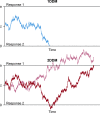Efficiency in redundancy
- PMID: 39048689
- PMCID: PMC11269681
- DOI: 10.1038/s41598-024-68127-x
Efficiency in redundancy
Abstract
In engineering, redundancy is the duplication of vital systems for use in the event of failure. In studies of human cognition, redundancy often refers to the duplication of the signal. Scores of studies have shown the salutary effects of a combined auditory and visual signal over single modality, the advantage of processing complete faces over facial features, and more recently the advantage of two observers over one. But what if the signal (or the number of observers) is fixed and cannot be altered or augmented? Can people improve the efficiency of information processing by recruiting an additional, redundant system? Here we demonstrate that recruiting a second redundant system can, under reasonable assumptions about human capacity, result in improved performance. Recruiting a second redundant system may come with a higher energy cost, but may be worthwhile in high-stakes situations where processing information accurately is crucial.
Keywords: Cognitive system; Decision making; Information processing.
© 2024. The Author(s).
Conflict of interest statement
The authors declare no competing interests.
Figures






References
-
- Middleton, D. H. Avionic Systems (Longman Publishing Group, 1989).
-
- Downer, J. When failure is an option: Redundancy, reliability and regulation in complex technical systems. In Number DP 53 in CARR Discussion Papers. Centre for Analysis of Risk and Regulation, London School of Economics and Political Science (2009).
-
- Ratcliff, R. A theory of memory retrieval. Psychol. Rev.85, 59–108 (1978).10.1037/0033-295X.85.2.59 - DOI
-
- Kinchla, R. A. Detecting target elements in multielement arrays: A confusability model. Percept. Psychophys.15, 149–158 (1974).10.3758/BF03205843 - DOI
MeSH terms
LinkOut - more resources
Full Text Sources

